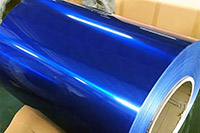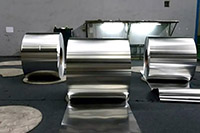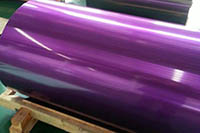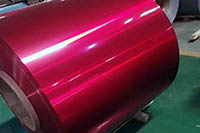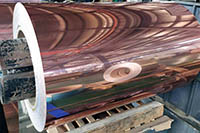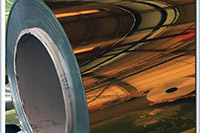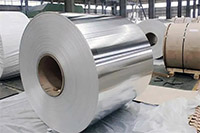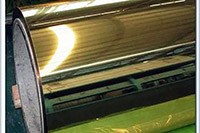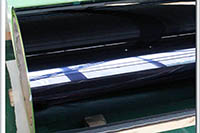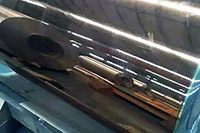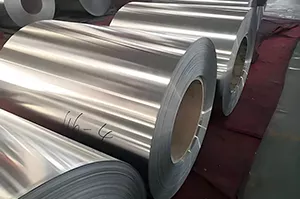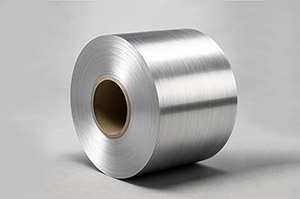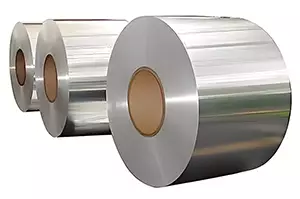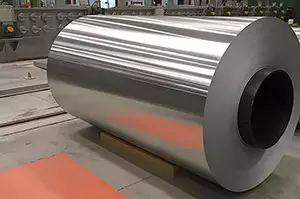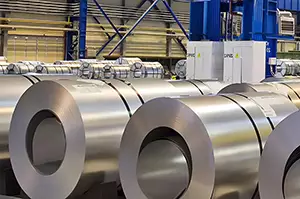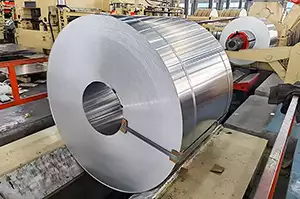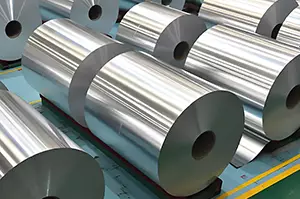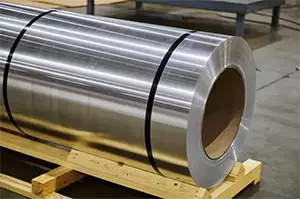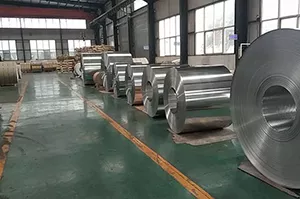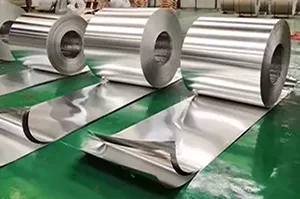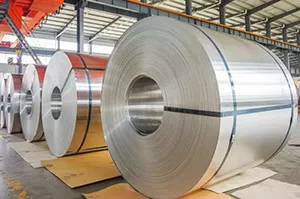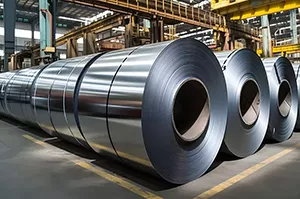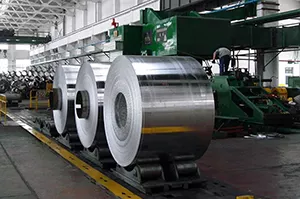1100 Aluminum Coil
1100 is a commercially pure aluminum alloy, containing 99.0% to 99.95% aluminum, with small amounts of silicon, iron, copper, manganese, zinc, titanium, and other elements.
1100 aluminum coil is the highest industrial purity aluminum, and due to its controlled copper content, it is also the strongest alloy in the 1xxx series, while retaining most of the characteristics of pure aluminum: excellent electrical conductivity, corrosion resistance, and formability.
1100 aluminum coil cannot be strengthened by heat treatment. Due to its excellent plasticity, corrosion resistance, and electrical and thermal conductivity, it is widely used in construction, industry, and daily consumer fields.
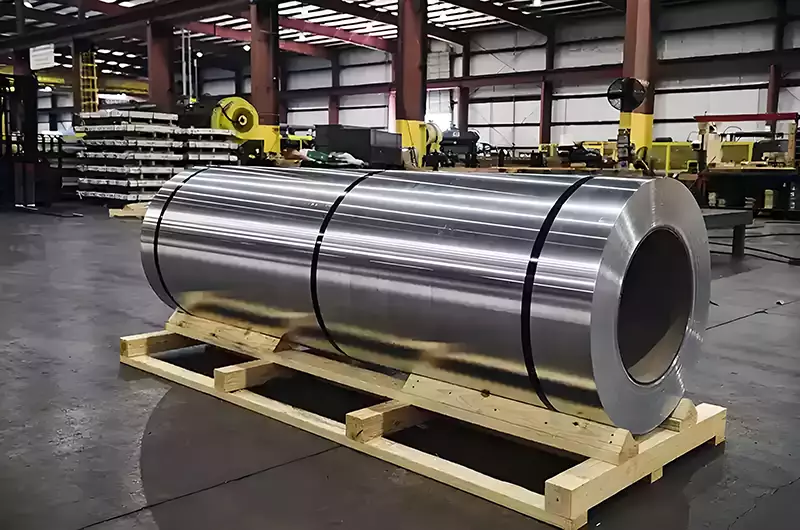
1100 aluminum coil is a soft, versatile, and corrosion-resistant alloy suitable for forming-intensive applications requiring high electrical conductivity and weldability (but not strength). It is available in various tempers, thicknesses, and surface treatments, and is widely used in HVAC, chemical/food processing, decorative trims, and metal products.
1100 aluminum coil remains indispensable for applications prioritizing formability and corrosion resistance over high strength. Its adaptability in different tempers and compatibility with various manufacturing processes have consolidated its status in heat treatment, construction, and consumer sectors.
1100 Aluminum Coil Standard Specifications and Availability
| Item | Description |
| Thickness Range | 0.1 mm – 300 mm (common range: 0.2 mm – 8 mm) |
| Width Range | 100 mm – 2620 mm (standard: 500 mm – 2500 mm) |
| Temper | O, F, H12–H38, H111, H112 |
| Surface Treatment | Mill Finish, Anodized, Polished, Embossed, Coated |
| Minimum Order Quantity | 1–5 tons |
| Delivery Time | Typically 3–5 weeks for full coil orders |
| Standards | ASTM B209/B210/B211/B221; ISO 6361; AMS-QQ-A-250/1, etc. |
1100 Aluminum Coil Mechanical Properties and Tempers
1100 coil is available in various tempers, such as O (annealed), H12, H14, H16, H18, and H19. Here are typical property ranges:
| Alloy-Temper | Tensile Strength (ksi) | Yield Strength (ksi) | Elongation (%) |
| 1100-O | 13 | 5 | 30 |
| 1100-H14 | 18 | 14 | 3 |
| 1100-H18 | 24 | 22 | 2 |
- Cold Workability: Strengthening is achieved solely through cold working (not heat treatable), allowing precise control of hardness.
- Low Temperature Performance: Strength increases at subzero temperatures without becoming brittle.
1100 H18 Aluminum Coil
- Characteristics: H18 is in a fully hardened temper, with relatively high strength but poor ductility and formability.
- Properties: Excellent corrosion resistance, thermal conductivity, and electrical conductivity, with good surface finish.
- Processing: Not suitable for further deep processing or complex forming, generally used for direct applications or surface treatments.
- Applications: Mainly used in fields requiring relatively high strength and good corrosion resistance, such as roofing decoration, curtain wall panels, billboards, lighting, daily utensils, and electronic product casings.
1100 H14 Aluminum Coil
- Characteristics: H14 is a half-hard temper, balancing certain strength and good ductility.
- Properties: Maintains high corrosion resistance and excellent weldability, while also offering good formability.
- Processing: Suitable for rolling, stamping, drawing, and bending, meeting the needs of conventional forming and surface treatment processes.
- Applications: Widely used in architectural decoration, roofing and wall cladding, chemical equipment, food processing and storage utensils, and appliance panels.
1100 O Aluminum Coil
- Characteristics: O temper is the fully annealed state, with the lowest strength but excellent ductility and formability.
- Properties: Offers excellent corrosion resistance and weldability, suitable for deep drawing and stretch forming processes.
- Processing: Can undergo extensive cold working or deep processing, such as stamping, spinning, and deep drawing.
- Applications: Mainly used in fields requiring high formability, such as kitchen utensils, chemical storage tanks, roofing decorative panels, vehicle interiors, lighting, and household appliances.
1100 Aluminum Coil Physical and Functional Properties
- Melting Range: 643–657°C (1190–1215°F)
- Thermal Conductivity: 222 W/m·K (suitable for heat exchangers)
- Electrical Properties: 59–62% IACS conductivity (suitable for busbars)
- Corrosion Resistance: Exhibits excellent atmospheric and chemical corrosion resistance due to the formation of an oxide layer.
- Density: 2.71 g/cm³ (lightweight, suitable for transport-sensitive applications).
Chemical Composition Of 1100 Aluminum Alloy
| Element | Percentage By Weight |
| Aluminum (Al) | 99.0 – 99.95% |
| Iron (Fe) | 0 – 0.95% |
| Silicon (Si) | 0 – 0.95% |
| Copper (Cu) | 0.05 – 0.20% |
| Manganese (Mn) | 0 – 0.05% |
| Zinc (Zn) | 0 – 0.1% |
| Other | 0 – 0.15% |
1100 Aluminum Coil Features
Excellent Formability
1100 aluminum alloy is one of the higher purity aluminum alloys on the market. Although it has low strength, it offers excellent formability. In the annealed and tempered state, the alloy is very soft and highly suitable for manufacturing processes such as spinning, bending, stamping, roll forming, and drawing.
Strengthening Through Cold Working
1100 aluminum cannot be heat treated, but its hardness can be increased through cold working processes. Its strength also improves at subzero temperatures. We can provide industrial-grade aluminum coil, foil, sheet, and wire products in the temper conditions required.
Thermal Conductivity
1100 aluminum coil possesses excellent thermal and electrical conductivity. Due to these superior thermal properties, it is widely used to manufacture heat exchanger components such as fins and radiators used in electronic devices.
Good Corrosion Resistance
The corrosion resistance of 1100 aluminum makes it very suitable for producing heavy-duty structures and components that require weather resistance. These parts include oil tank fittings in pipeline applications, train car components, ship parts, building materials, and even aircraft gun mount components.
1100 Aluminum Coil Surface Treatments
1100 Mill Finish Aluminum Coil
- Description: Supplied in its natural rolled state without further surface treatment, showing the metallic silver appearance of pure aluminum.
- Features: Good corrosion resistance, excellent formability, and smooth surface suitable for further processing.
- Applications: Commonly used in roofing, siding, curtain wall panels, chemical equipment, and daily utensils.
- Description: Undergoes anodizing treatment to form a dense oxide layer on the surface.
- Features: Improved corrosion resistance, hardness, abrasion resistance, and decorative appeal.
- Applications: Widely used in architectural facades, roofing, electronic shells, kitchenware, and decorative materials.
- Description: Surface polished to achieve mirror-like reflective effect.
- Features: High brightness, good reflectivity, and corrosion resistance.
- Applications: Used in lighting reflectors, decorative panels, home appliances, and interior decoration.
- Description: Surface processed with embossed patterns (such as diamond, orange peel).
- Features: Enhanced aesthetics, slip resistance, and durability.
- Applications: Flooring, decorative panels, refrigerator liners, packaging, and automotive interior panels.
1100 Coated Aluminum Coil
- Description: Coated with paint or protective film on the aluminum surface.
- Features: Good weather resistance, color variety, and extended lifespan.
- Applications: Building decoration, roofing, curtain wall cladding, and appliance panels.
1100 Laminated Aluminum Coil
- Description: Surface laminated with plastic film, kraft paper, or decorative foil.
- Features: Improved moisture resistance, wear resistance, and decorative performance.
- Applications: Packaging, appliance exteriors, and decorative materials.
1100 Brushed Aluminum Coil
- Description: Surface treated with brushing process to create uniform texture lines.
- Features: Decorative appearance, fingerprint resistance, and good surface hardness.
- Applications: Home appliance panels, furniture, interior decoration, and electronic casings.
1100 Painted Aluminum Coil
- Description: Painted with high-quality coatings (PE, PVDF) for surface protection and color.
- Features: Bright colors, UV resistance, corrosion resistance, long service life.
- Applications: Architectural roofing, cladding panels, billboards, and decorative components.
1100 Pre-Coated Aluminum Coil
- Description: Pre-coated during continuous coil coating line with controlled uniformity.
- Features: Stable color, consistent film thickness, superior adhesion.
- Applications: Roofing, curtain wall, ceilings, and industrial cladding.
1100 Pre-Painted Aluminum Coil
- Description: Pre-painted in continuous coil coating process before forming.
- Features: Saves subsequent painting cost, ensures durable decorative effect.
- Applications: Architectural decoration, transport vehicles, household appliances, advertising panels.
1100 PVC Coated Aluminum Coil
- Description: Surface covered with PVC film for extra protection and decoration.
- Features: Excellent moisture resistance, abrasion resistance, and surface smoothness.
- Applications: Packaging, interior decoration, appliance panels, and wall coverings.
1100 PVDF Coated Aluminum Coil
- Description: Coated with PVDF (polyvinylidene fluoride) fluorocarbon paint.
- Features: Outstanding weather resistance, anti-fading, UV and corrosion resistance.
- Applications: High-end curtain walls, exterior cladding, roofing systems, and outdoor billboards.
1100 Stucco Embossed Aluminum Coil
- Description: Surface embossed with stucco-like textured pattern.
- Features: Anti-slip, anti-scratch, aesthetic, and good light diffusion.
- Applications: Refrigerators, insulation jacketing, roofing, and wall panels.
1100 Textured Aluminum Coil
- Description: Manufactured with customized textured surface for special decorative effects.
- Features: Enhanced visual appeal, anti-fingerprint, wear resistance.
- Applications: Interior decoration, furniture, wall panels, signage, and appliance surfaces.
1100 Wood Aluminum Coil
- Description: Surface coated with wood grain finish by heat transfer or printing process.
- Features: Realistic wood appearance, weather resistance, corrosion resistance.
- Applications: Used in ceilings, wall panels, furniture, window frames, and decorative facades.
1100 Aluminum Coil Color Options
Processing Properties of 1100 Aluminum Coil
Processing
- Formability: 1100 aluminum coil belongs to the pure aluminum series, with good ductility, suitable for deep drawing, stretching, bending, rolling, and various forming processes.
- Machinability: Machinability is average, not as good as alloy aluminum, but sufficient for conventional machining.
- Surface Treatment: Can undergo anodizing, electroplating, coating, and laminating treatments to enhance decorative effect and corrosion resistance.
- Applications: Commonly used in stamped cookware, roofing and curtain wall panels, chemical containers, daily utensils, and decorative panels.
Heat Treatment
- Heat Treatability: 1100 aluminum is a non-heat-treatable alloy and cannot be strengthened by heat treatment.
- Strengthening Method: Strength is mainly improved through cold working (such as cold rolling and cold drawing).
- Tempers: Common tempers include O (annealed), H12, H14, and H18, corresponding to different levels of cold work hardening.
Welding
- Weldability: 1100 aluminum coil has excellent weldability and is suitable for gas welding, TIG welding, resistance welding, and other methods.
- Welding Performance: Welded joints maintain relatively high strength while preserving good corrosion resistance.
- Notes: It is recommended to use 1100 or 4045 aluminum welding wire to ensure bonding strength and corrosion resistance of the weld seam and base material.
- Applications: Suitable for manufacturing chemical containers, food processing equipment, pipelines, and architectural decorative components that require welding.
1100 Aluminum Coil Common Applications
1100 Aluminum Coil Application Fields and Examples
- Architectural Curtain Wall Aluminum Panels
- Road Sign Production
- Vehicle Body Skin Materials
- Electronic Product Enclosures
| Application Field | Product Name | Application Description |
| Construction Industry | Curtain Wall Aluminum Panels | Curtain wall aluminum panels use 1100 aluminum coil as the base material. Due to its good corrosion resistance and machinability, it can be formed by sheet metal shaping and surface spraying to create various shaped architectural curtain wall panels, widely used in high-rise building exterior decoration. |
| Construction Industry | Decorative Materials | Decorative materials (such as ceilings and interior aluminum ceiling tiles) use 1100 aluminum coil for roll coating and embossing treatments. The finished products are lightweight, beautiful, and easy to install, making them especially suitable for interior ceilings and commercial space decoration. |
| Construction Industry | Aluminum Composite Panel Substrate | Aluminum composite panel substrates typically use 1100-H18 temper aluminum coil, which has good rigidity and weather resistance. It is a common upper metal panel material for composite materials such as exterior advertising boards, exhibition panels, and commercial signage. |
| Transportation | Vehicle Body Skin | Vehicle body skins made from 1100 aluminum coil benefit from its light weight, rollability, and good corrosion resistance. It is suitable for the outer skin of trucks, refrigerated vehicles, and buses, reducing vehicle weight while enhancing corrosion resistance. |
| Transportation | Road Signs | Road signs are commonly made from 1100-H14 or H18 temper aluminum coil. These products have good reflective film adhesion and flatness, suitable for permanent or temporary signs on highways, urban roads, and construction areas. |
| Transportation | Ship Components | Ship components made from 1100 aluminum coil include interior cabin panels, ceilings, and non-load-bearing shells. Due to its strong seawater corrosion resistance and ease of processing, it is a common material for small boats and ship interior decoration. |
| Electronics and Daily Products | Electrical Enclosures | Electrical enclosures such as battery cases, transformer covers, and heat sinks use 1100 aluminum coil for its excellent electrical and thermal conductivity and ease of forming, making it suitable for electrical structural parts with high thermal management and formability requirements. |
| Electronics and Daily Products | Lamp Reflectors | Lamp reflectors use 1100 aluminum coil with polished or anodized surfaces to achieve high reflectivity. They are widely used in downlights, energy-saving lamps, and industrial lighting equipment to improve lighting efficiency and aesthetics. |
| Electronics and Daily Products | Cookware (Pots and Lids) | Cookware such as frying pans, saucepans, and food packaging aluminum lids generally use 1100-O temper aluminum coil because it is non-toxic, safe, and has good ductility, suitable for deep drawing and spinning forming processes. |
| Electronics and Daily Products | Printing Plates | Printing plates use 1100 aluminum coil as the base material for CTP (Computer-To-Plate) plates, featuring high flatness and good surface treatment performance, making it an indispensable raw material in the offset printing industry. |
What Other Fields Use 1100 Aluminum Coil?
- Thermal Management: Heat exchanger fins, condenser plates, radiators, HVAC systems (utilizing high thermal conductivity).
- Chemical and Food Equipment: Storage tanks, processing equipment, chemical storage containers, heat exchanger components, sheet metal stamped parts.
- Decorative Trims: Polished or anodized for gifts and signage.
- Cookware and Aluminum Foil
- Electrical Components: Heat sinks, busbars.
- Fabricated Parts: Spun parts, stamped parts, deep-drawn parts.
- Construction: Composite panels (ACP), roofing, decorative facades (corrosion resistant).
- Consumer Goods: Cookware, lighting reflectors, nameplates (adaptable surface treatments).
- Packaging: Refrigerator liners, chemical containers (formability + corrosion resistance).
Advantages and Disadvantages of 1100 Aluminum Coil
Advantages of 1100 Aluminum Coil
- Excellent formability, weldability, corrosion resistance, and electrical conductivity
- Suitable for decorative surface treatments and easy to process
- Outstanding formability among aluminum alloys
- 100% recyclable with minimal environmental impact
- Non-magnetic, suitable for special applications
| Advantage Category | Description |
| Corrosion Resistance | Easily forms a dense oxide film on the surface, effectively resisting atmospheric and moisture corrosion; anodizing further enhances protection |
| Workability | Excellent ductility, suitable for stamping, spinning, welding (gas welding, arc welding), and brazing; high forming efficiency and low tool wear |
| Electrical and Thermal Conductivity | Good electrical and thermal conductivity, ideal for radiators and conductive components |
| Environmental and Safety Performance | Non-toxic material compliant with food contact standards; widely used in food packaging, cookware, and beverage sealing |
| Recyclability | 100% recyclable, requiring only about 5% of the energy needed for primary aluminum smelting, making it eco-friendly, low-carbon, and energy-efficient |
Disadvantages of 1100 Aluminum Coil
- Low strength, not suitable for high-pressure or load-bearing structural applications
- Low yield strength limits its use in high-stress scenarios
- Not suitable for high-temperature environments (>150°C)
Aluminum Coil 1100 Comparison to Competing Alloys
| Property | 1100 | 1050 | 3003 |
| Al Purity | 99.0% | 99.5% | 98.6% |
| Tensile (O) | 90 MPa | 75 MPa | 110 MPa |
| Typical Use | Deep drawing | Chemical tanks | Structural panels |
Explore Different Aluminum Coil Grades
Further reading
- 1100 Aluminum Plate Sheet
- 1100 0 aluminum sheet
- 1100 h14 aluminum sheet
- 1100 h18 aluminum sheet
- 1100 h12 aluminum sheet plate
- 1100 H16 Aluminum
- 1100 H22 Aluminum
- 1100 H24 Aluminum
- 1100 H26 Aluminum
- 1100 H28 Aluminum
- 1100 Aluminum Foil
- 1100 Aluminum Disc Circle
Users viewing this material also viewed the following
- 1100 H16 Aluminum Sheet Roll for Refrigerator Linings
- 1100 Embossed Aluminum Sheet
- Hemispherical embossed aluminum sheet coil 1050 1060 1100 for automotive heat shield
- 1100 Aluminum Sheet for PCB (Printed Circuit Board)
- 1100 Aluminum Plate for Heat Sink Applications
- 1100 Aluminum Plate for Printing Plates
- 1100 Aluminum Plate for Building Exterior Cladding
- 1100 Aluminum Veneer Panel
- 1100 Aluminum Plate for Stair Handrails
- 1100 Aluminum Plate for Pressure Tanks
- 1100 O/H14 Aerospace Aluminum Sheet and Plate
- 1100 Aluminum Plate for New Energy Charging Stations
- 1100 Embossed Aluminum Sheet for Automotive Heat Shield
- 1100 Aluminum Plate for Aluminum Composite Panels
- 1100 Corrugated Aluminum Sheet
Recommended Content
- 1100 vs. 1050 Aluminium Which Alloy is Right for Your Project?
- 1100-H14 Aluminum vs. 1100-H24 Aluminum
- 1100-H14 Aluminum vs. 1100-H16 Aluminum
- 1100-H14 Aluminum vs. 1100-H18 Aluminum
- 1100-H12 Aluminum vs. 1100-H14 Aluminum
- 1100-H14 Aluminum vs. 1100-O Aluminum
- 1060-O Aluminum vs. 1100-H14 Aluminum: A Comparative Analysis
- 1060 Aluminum vs. 1100-H14 Aluminum: Key Differences
- Comparison of 1060-H28 Aluminum vs. 1100-H28 Aluminum

